|
|
|
|
Earlier in April
April Continues More Ramblings
April 4, 2000:
All filled in on the current movies (I watched Hurricane,
Cider House Rules and the Green Mile within the past week) I'm
re-energized to go hit the developing road again. Istanbul brought
me to the Syrian embassy, who gladly welcomed my 65$ fee and
bouqette of flowers in return for a 15 day visa to their country,
but Istanbul also showed me the door, closed and pad-locked,
to the Iranian embassy. Having fled Iran I wanted to return on
my own terms. I trucked into the embassy last week, slapped down
my passport, pictures and 50$ fee and was told I'd have to wait
a week for my visa. Exactly one week later I walked back to the
Iranian embassy only to have them say no, of course. Actually
they said "Come back in two weeks." So I asked what
then, and then they said "Not possible." Who knows
why they couldn't just come out and say that first. I pleaded
a little with them but Iranian consulates aren't really the type
of people you can plead with. The fellow just shook his head
and showed me the door. So onto Syria I go.
Here, at the Ail Baba Hotel and Carpet Shop, I'm getting ready
to move east. I bought my bus ticket for the12 hour night ride
to Konya in central Turkey this morning and now the only thing
left to do is settle the hotel bill. Since the Ail Baba has the
added luxury of being a carpet shop (and it also happens to be
the end of the low season and therefore the hotel staff has way
too much free time on their hands) settlleing the bill has been
a bit of a tennis match---them throwing out numbers and me returning
them. Of course, usually this is all quite unnecessary. Matters
of payment normally are settled before the act they cover is
carried out. But true to my good travel form, I treated this
stay like one of the dinners I had a few days back. When I sat
down to order and asked for the menu the cute little Turkish
woman answered "no menu. Fish or meat?" I said "Fish,
thank you. How much?"And she retorted with a huge grin and
several light pats on my shoulder "No. No. Don't worry.
It will be no problem." So I went ahead and trusted that
Mediterranean smile and enjoyed what turned out to be my most
expensive meal to date in the last four months. (I'm beginning
to see a theme: No Problem = Big Problem.)
I admit that I might be a slow learner. We'll see what happens
at the Ail Baba. If I buy a rug you know I'm hopeless.
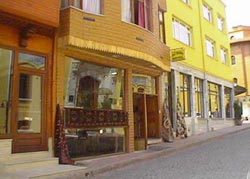
(The famous Ali Baba Hotel and Carpet Shop. After leaving the Russian district of Istanbul
I found myself in the Baba. Contrary to the name (ie: and Carpet
Shop) the hotel was beyond pleasant, bringing me fresh flowers
and fruit and never once mentioning the c-word.)
April 6, 2000:
I know you're all dying to hear about my new carpets but I
held out. In fact, I did a rather nice job of bargaining with
the old Ali Baba. After more than 6 hours flip-flopping between
their price and mine it came down to the owner himself. The managers
all pointed me towards him,, a strong figure of a Turkish man
leaning against the building just outside the hotel. I shuffled
up next to him, "Sir, I have a question..." He smiled,
grabbed my arm and took me inside to not only agree with my quote
but to additionally knock off 10 extra dollars.
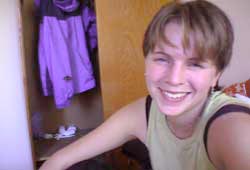
(Me after talking to the owner of the Ali Baba. Having spent 10 days in the center of Istanbul in the Baba I
was mentally preparing myself for the bill. But when I spoke
with the owner he promptly agreed to my "suggestion"
and took an additional 10$ off. Needles to say, it put a smile
on my face.)
So grinning from the tips of my toes to the end of my hair
I boarded a fancy Turkish bus an hour later for Konya a mere
10 hours away. I must admit that peeling my eyes open at 6am
after the bus driver shoved me and my baggage off the bus only
to land in the middle of Nowhere-Industrial-City was not the
image I had in my head of the city of Konya, the poet Rumi's
stomping grounds. I expected more of the mosque covered corners
and tree-lined parks of Istanbul, what I saw were apartment housing,
row after row of them, and bare pot-holed streets.
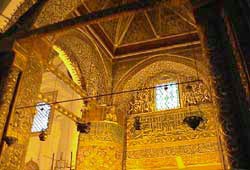
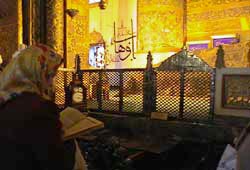
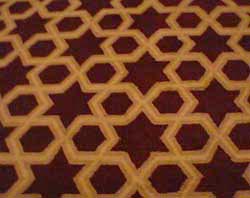
(Arriving in central Turkey in the town of Konya
I trucked immediately over to see the tomb of Turkey's most famous
poet, Celaleddin Rumi. Most of the 1.5 million visitors to this holy place are Muslim
Turks. And amidst the bus-loads of German and Japanese tour groups
some of the devout tried (unsuccessfully) to climb the ropes
and touch the sarcophagus. Guards had to politely request people
not to pray in the mosque-turned-museum as tourists stepped around
and pushed their way through the crowds to catch a glimpse. This
just happens to be a quick shot of the carpet in Rumi's tomb.
(It's my current screen background,
if anyone's interested.) An overly excited Turkish woman grabbed
my camera to take a photo of me in front of the sarcophagus.
This was the result.)
I stumbled into a parking lot and onto a mini-bus. My Turkish
is beyond pathetic but I managed to get the driver to drive me
to my hotel. After checking in, taking a quick nap and (not because
of choice) a cold shower I hit the streets. Two hours later I'd
seen some of the great (and under-appreciated) museums of Konya
and been invited to stay with a Turkish family for the weekend.
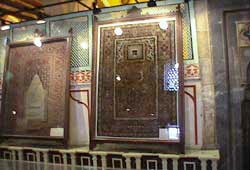
Sitting in the courtyard of a great archive of Turkish history,
the Kataray Tile Museum, I pulled out my book to read a little
in the saftey and quiet of the museum grounds before heading
out to scavenge for an early dinner. Two minutes and pages later
four Turks sat down at my table with a large pot of cay
(pronounced chai), or tea. They all worked at the museum and
a large Japanese tour group had just finished buying their share
of hand painted plates and snapping over 20 rolls of film. It
was time for some tea, they motioned. Surprisingly enough none
of them spoke English. I'd gotten so accustomed to rambling on
to museum staff in my mother tongue because all the monuments
and tourists sites have always been filled with those natives
with the ability to communicate and convince foreigners that
they really do need a picture book of the site or an authentic
piece of building to commemorate their trip for only a small
price that's always "very cheap for you." So we sat
and drank glass after tulip-shaped glass of tea in silence. 10
minutes later a young girl named Gulfem came strolling into the
courtyard and the Turks piped up, excitedly greeting her. You
see, Gulfem spoke English.
"Hello. They want to know where you are from." And
I told her America. One half-hour later, after a full conversation
about "Little America" (Turkey) and America, Gulfem
invited me to stay in her home.
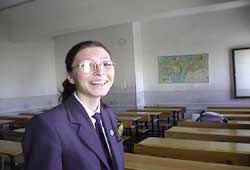
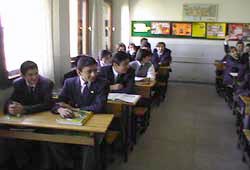
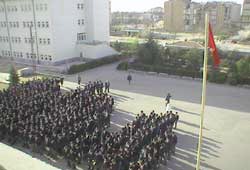
This morning I went with Gulfem to her school and taught the
days English classes. This afternoon I lunched with Gulfem's
family and went with them to a little village just outside Konya
to look at old mosaics planted firmly for centuries on the floors
of churches built right into the hillside. And tomorrow I'll
visit some of Gulfem's uncles and aunts and learn how to make
a few Turkish meals.
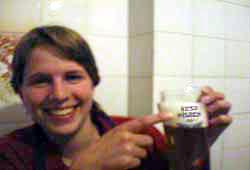
Turkey, as an understatement, is fantastic. Not only can you
find hospitality in the courtyards of little-known towns but
you even get it handed to you in the tourist laden heart of the
country.
April 12, 2000:
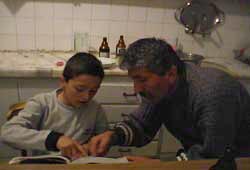
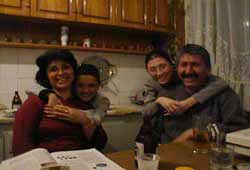
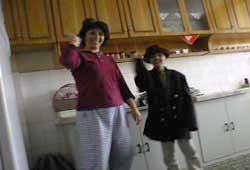
I didn't really know what to expect when the Gurhans put me
on the bus to Goreme in the Cappadocia region of Turkey. "You
should go to the sea." It was the first thing Mr Gurhan
had said to me in English, it also happened to be the last as
I humped myself and 50 ton backpack up the steps. So I honestly
didn't know what to expect when the bus rounded a large sand
mountain three hours east of Konya (and much more from the sea)
and dropped me at the foot of a village completely carved into
the hillside. Weird, I thought. Tourists have been coming
to Goreme since the Hippies made it popular on the overland route
to India back in the '70s, and I could see why: surrounded by
100ft tall sand spires, Goreme was fairy tale land. Because of
this name nearly half of the some 60 pensions and hotels refer
to the "fairy chimneys" where you can pay to sleep
in a dark cave that you have to climb a ladder to get to and
then climb on your hands and knees to enter. Really weird,
I couldn't help thinking over and over as I spent the remainder
of the day checking out as many accommodations I could. One can't
afford to choose a bad hole in the wall, right?
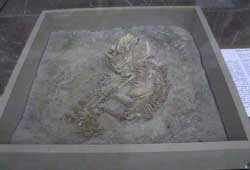
After unloading my pack in the brightest place I could find
I headed down to the center of town to see what I could see.
(Aimlessness seems to have taken on some form of purpose for
me.) "Hey, so you found a place to stay, huh?" Came
the voice of an Irish ex-pat who now lived in Goreme and had
just become the proud partner of pension number 61. "Yeah,"
I said. "Did you know that this place is really weird?"
And he grabbed me by the arm and pulled me over to the curb to
sit down. "Look at that." He pointed up at the sky.
"They have pigeons here." I said. He ignored my comment,
obviously not liking its taste, and kept staring at the birds.
"Did you see that?" he asked five minutes later as
the bird dipped and flew around and around. "Wha..."
and before I could finish I saw what he had been so serious about.
The pigeon was doing back flips. My mouth fell open to land gently
on my knee. Weird. And yet the back-flipping pigeons almost
made sense. "You know, they only do that above their homes.
They're not wild pigeons. The villagers keep them as pets. They're
just playing."
I don't know what to tell you. Backpackers come in hordes
to this tiny village made of mud; they sleep in caves, march
around the country-side in shorts and tank-tops and as far as
I can tell, none of them have ever noticed the back-flipping
pigeons. "They've been doing it for years." said the
old Turkish women who accosted me in the street, dragged me into
her home and shoved glass after glass of Turkish tea down my
throat. "Does it bother you?" I asked, talking about
the tourists not the pigeons, and fingering one of the many embroidered
scarfs she was making for her daughter's upcoming wedding. "No.
No, it just means I don't have to spend all my time talking to
my pigeons." Weird.
(From antique carpets to skeletons of children from antiquity, from
early morning English classes to late night math sessions, Konya
and the Gurhan family gave me a little window on life for the
modern Turk in the 21st century.)
|
|






